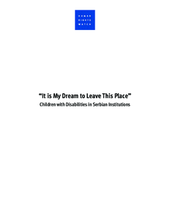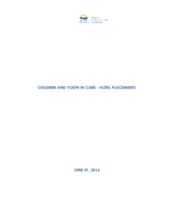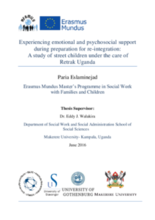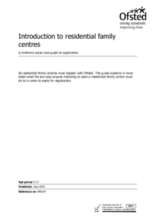Displaying 951 - 960 of 1482
Using unique 5-year longitudinal data on Korean children in group homes and those under institutional care, this paper compared the medium-term cost-effectiveness of group homes and that of institutional care facilities in terms of developmental outcomes.
This report from Human Rights Watch focuses on the institutionalization of children with disabilities in Serbia.
The role of residential care for children has developed very differently internationally, but in all cultural contexts, there are questions about the extent to which it can help young people recover from high risk backgrounds. In the UK, residential care has come to be seen as the placement of last resort, yet new government guidance on permanence has suggested that residential care can provide security and a sense of belonging.
This special report from the Ministry of Children and Family Development in British Columbia, Canada presents findings on the number of children in care in the province who were sent to stay in hotels.
This paper presents selectively on the findings of two separate but related qualitative Irish studies exploring relationship-based approaches in residential child care practice, from the perspectives of both residential child care workers and young care leavers.
This thesis investigates children’s experience of psychosocial and emotional support of (nonparental) caregivers in residential facilities in preparation for their re-integration into family based care.
This desk review examines the reasons children are being placed in care, evaluates the types of care in the region, and discusses regional efforts towards deinstitutionalisation.
This guide by the UK's regulatory body, Ofsted, explains in detail what one must do in order to open a residential family centre.
Based on an exhaustive review of the global literature and utilising an innovative theoretical framework of ‘altruistic exploitation’, the authors explore the ironic juxtaposition of benefits and harms associated with orphan tourism to the various stakeholders.
This document is a report on a study which involved a survey of all foreign-born children placed in child and youth care centers across South Africa’s Western Cape Province. The study examines the intersection between migration law and children’s rights.





